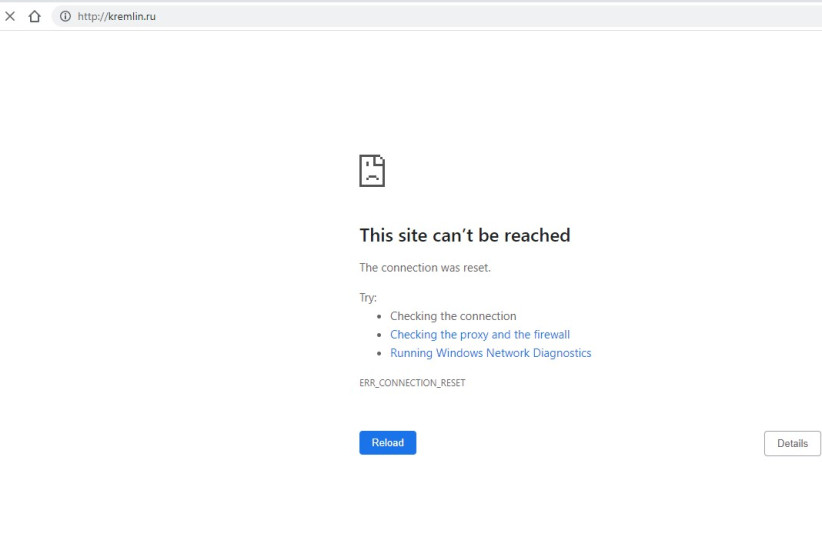Six Russian government websites including the Kremlin's official site were down for several hours on Friday and inaccessible following reports of cyberattacks on various Russian government and state media.
The exact reasons for the outages were not immediately clear, but the international hacking group Anonymous claimed that it was attacking the sites.
Some Russian government websites continued to be down on Saturday, as the country's invasion of Ukraine entered its third day.
The websites that are dark notably include the Kremlin and the Ministry of Defense.
Gosuslugi, Russia’s web portal of state services, went offline on Saturday night as well, with the Russian Ministry of Digital Development, Communications and Mass Media telling TASS that the site is facing cyberattacks on an "unprecedented scale."
"Anonymous has ongoing operations to keep .ru government websites offline, and to push information to the Russian people so they can be free of Putin's state censorship machine," the group said in a tweet.
On Friday, the same Russian websites appeared offline for a while, but the Kremlin denied it was being attacked by Anonymous, according to state media. It’s the third day in a row Russian websites have been inaccessible, at least for some period of time.
Anonymous said it is also working "to keep the Ukrainian people online as best we can."

This occurred as the government of Ukraine has asked for volunteers from the country's hacker underground to help protect critical infrastructure and conduct cyber spying missions against Russian troops, according to two people involved in the project. However, it is unclear if the two incidents are related.
As Russian forces attacked cities across Ukraine, requests for volunteers began to appear on hacker forums on Thursday morning, as many residents fled the capital Kyiv.
"Ukrainian cybercommunity! It's time to get involved in the cyber defense of our country," the post read, asking hackers and cybersecurity experts to submit an application via Google docs, listing their specialties, such as malware development, and professional references.
Yegor Aushev, the co-founder of a cybersecurity company in Kyiv, told Reuters he wrote the post at the request of a senior Defense Ministry official who contacted him on Thursday. Aushev's firm Cyber Unit Technologies is known for working with Ukraine's government on the defense of critical infrastructure.

Aushev said the volunteers would be divided into defensive and offensive cyber units. The defensive unit would be employed to defend infrastructures such as power plants and water systems. In a 2015 cyberattack, widely attributed to Russian state hackers, 225,000 Ukrainians lost electricity.
The offensive volunteer unit Aushev said he is organizing would help Ukraine's military conduct digital espionage operations against invading Russian forces.
"We have an army inside our country," Aushev said. "We need to know what they are doing."
On Wednesday, a newly discovered piece of destructive software was found circulating in Ukraine, hitting hundreds of computers, according to researchers at the cybersecurity firm ESET.
Suspicion fell on Russia, which has repeatedly been accused of hacks against Ukraine and other countries. The victims included government agencies and a financial institution, Reuters previously reported.
Russia has denied the allegations.
The effort to build a cyber military force is coming late in the game, Aushev acknowledged.
A Ukrainian security official said earlier this month that the country had no dedicated military cyber force, the Washington Post reported. "It’s our task to create them this year," he told the Washington Post.
Reached late Thursday night in Ukraine, Aushev said he already had received hundreds of applicants and was going to begin vetting to ensure that none of them were Russian agents.
